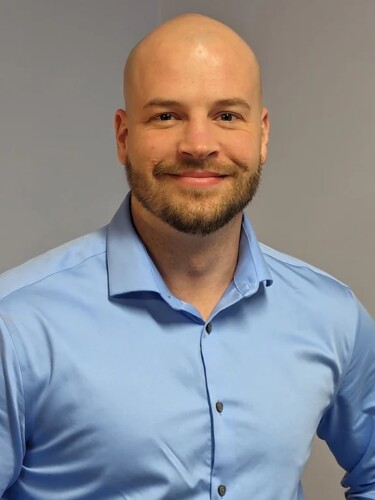After you listen to Randy Stevens describe his journey — from suffering sexual abuse as a young child through battling alcohol and drug addiction, to joining the military, to spending time in prison, to parenting children with another addict, to his initial refusal to accept help — you’re amazed that, somehow, he still made it to other side.

‘Right now, what we’re trying to do is just create an opportunity for members of our community to live in a program that is very supportive and connected directly to home,’ says Randy Stevens, executive director of Hope for NH Recovery. ‘We want to … increase the chances of success for people.’
Sober since 2018, Stevens is happily married (to a police officer) and helping people through Hope for NH Recovery, where he has served as executive director for nearly a year.
Stevens was a recent guest on NH Business Review’s “Down to Business” podcast, during which he shared a personal history full of chilling details. He talks about it often, knowing it will help other people in recovery find their own path through the darkness.
You can listen to Stevens’ story at nhbr.com or wherever you listen to the Down to Business podcast, including Spotify. It’s a tale of redemption worth hearing.
For this article, we focused on the programs Hope for NH Recovery offers, its plans to secure property for a recovery residential center in the Queen City and its upcoming fundraising gala May 15 at The Venues at The Factory. (Check recoverynh.org for details on tickets and sponsorships.)
Q. Roughly how many people do you serve on a daily, weekly basis that come through?
A: We have an active membership of Medicaid-insured qualified members from anywhere between 300 to 400 people.
We see an average of 800 to 1,000 visits a week come through our center. Some of those are the same people coming on different days or for different meetings. But that is the number that we track weekly.
Q. The tagline for the nonprofit is “My story, my strength.” Your story alludes to that; there’s an alignment with the nonprofit’s programs for individuals to use when going through this healing process.
A. Everybody expresses themselves in their story in their own unique way. My data and information manager, Dave Cote, is a phenomenal artist. He doesn’t care so much about the face-to-face conversation. That’s not how he does his recovery, but he paints such beautiful pictures. I had him paint one of my wedding for my wife for our anniversary. And it was just so beautiful. That’s how he tells his story.
Q. You have a new fundraiser coming up in May.
A. My wife is actually organizing it. We have the festival that happens in September that’s really about bringing providers and people together. The gala is about connecting the recovery community with businesses in Greater Manchester. It’s about sharing, that we all need to work together to make this successful. So by partnering with us in the gala, you’re supporting our programs. You’re helping to alleviate some of that pressure from the first responders that they’re experiencing. Because the more people that are here getting well, the less that our first responders are out there dealing with it.
Q. It’s a gala with a rock band and all the frills, right?
A. And there will be a bar. It’s tucked in the back away, so I don’t have to have to look at it. I’m just kidding. It doesn’t bother me. But there is a bar there. There will be fun food.
Q. You’re working on a housing project in Manchester for people in recovery. How will that work?
A. We are we’re looking for a house right now. Ideally in the future, we’ll have a bigger program that extends treatment for people. But right now, what we’re trying to do is just create an opportunity for members of our community to live in a program that is very supportive and connected directly to home.
We work closely with all the sober homes around here. They usually have some sort of ties to Hope for NH Recovery, but in this way, we want to be a part of it. So that the people you are talking to at your recovery residence are the same people you are talking to you here at Hope.
We’re going to have some partners, and we’re going to create some funding opportunities that are going to extend people’s treatments … We want to try to extend those out to increase the chances of success for people.
Q. Do you have any other projects or goals that you’d like to implement in the near future?
A. My overarching goal is to incorporate what I’m calling the Hope TLC — the Hope Transitional Living Community — which is beyond recovery housing. Think of it as a traditional rehabilitation program like Farnum Center or something like that, but bigger, more robust, with longer treatment. The way New Hampshire is set up, we are kind of stuck to, you have 28 days, you have 60 days. Then you have three months of these certain levels of care.
What I’m working on is creating a situation where people can still live in that same community, go to those same kind of treatments, but all in one place. And while they’re doing that, they’re getting connected to the resources that are in the community.

